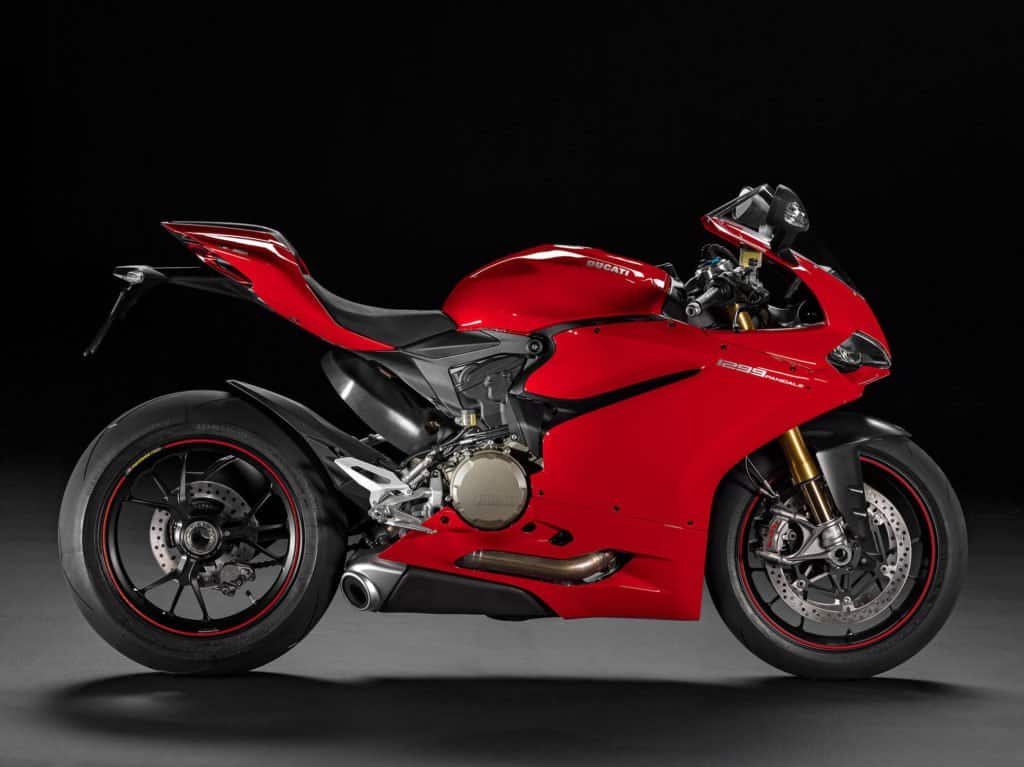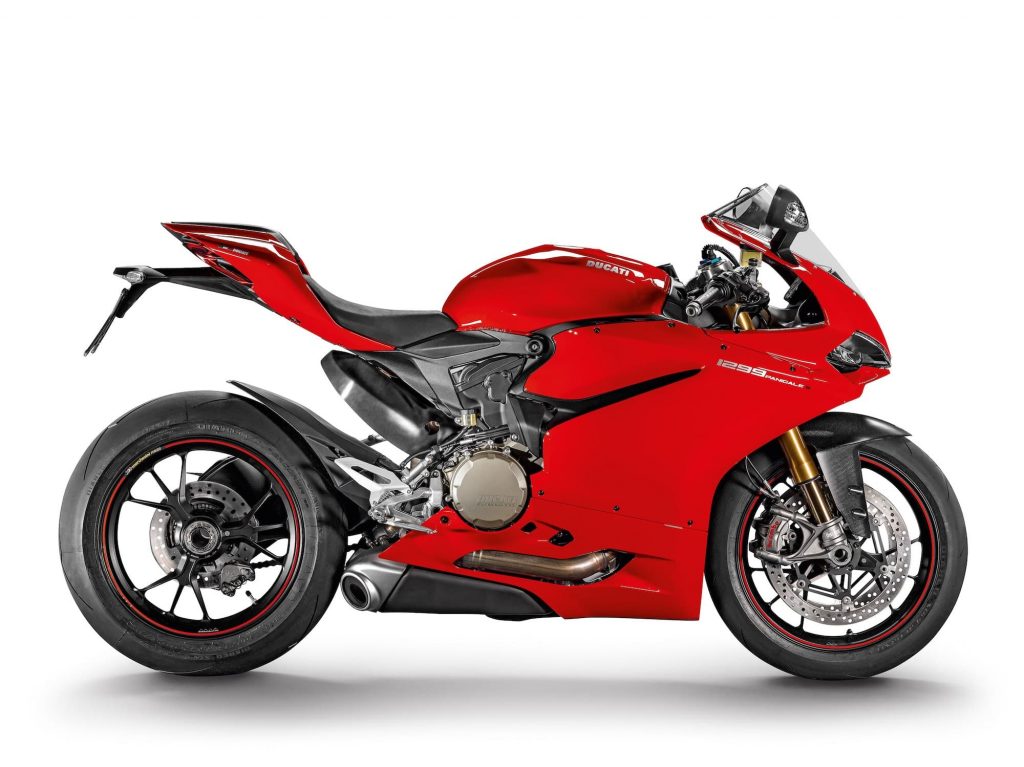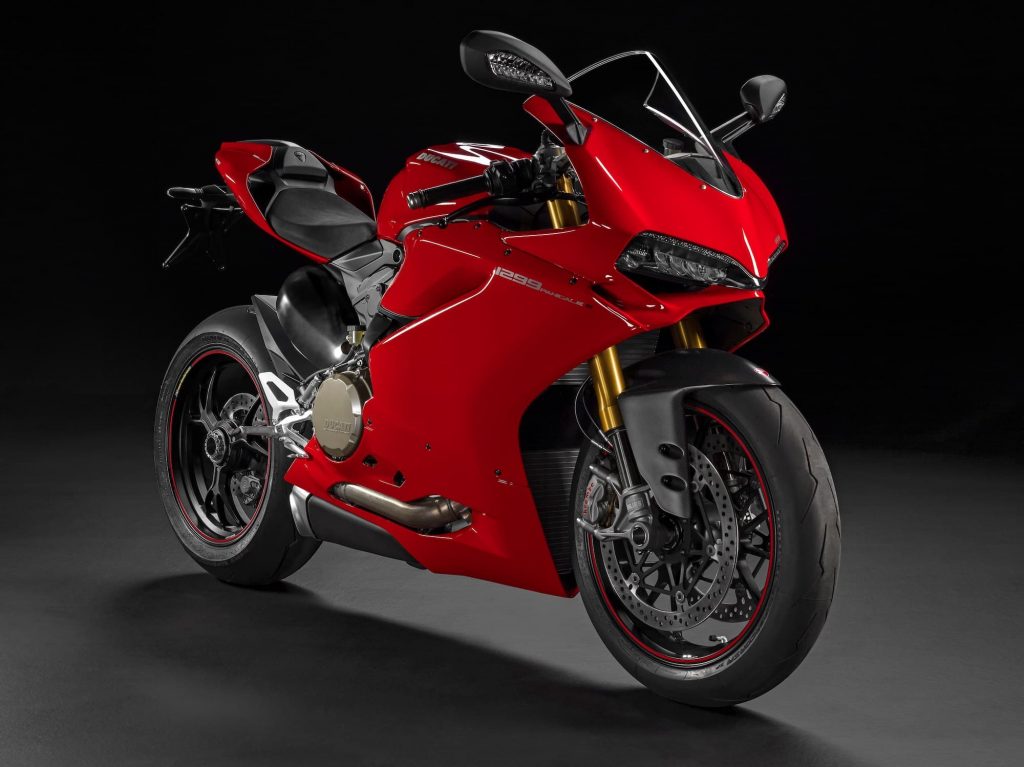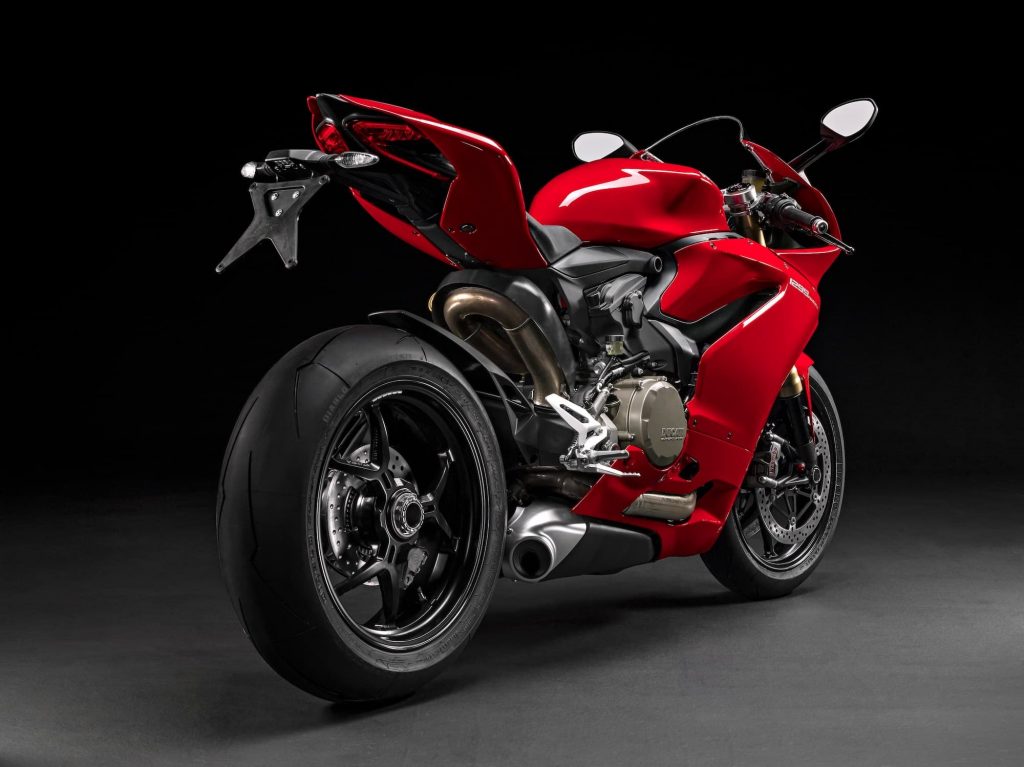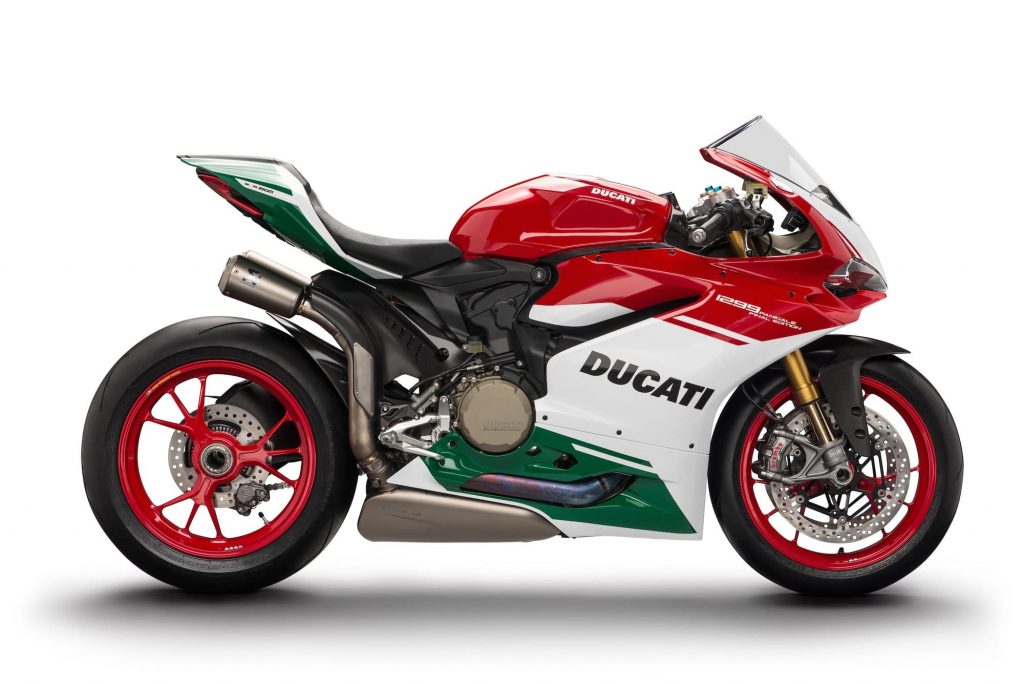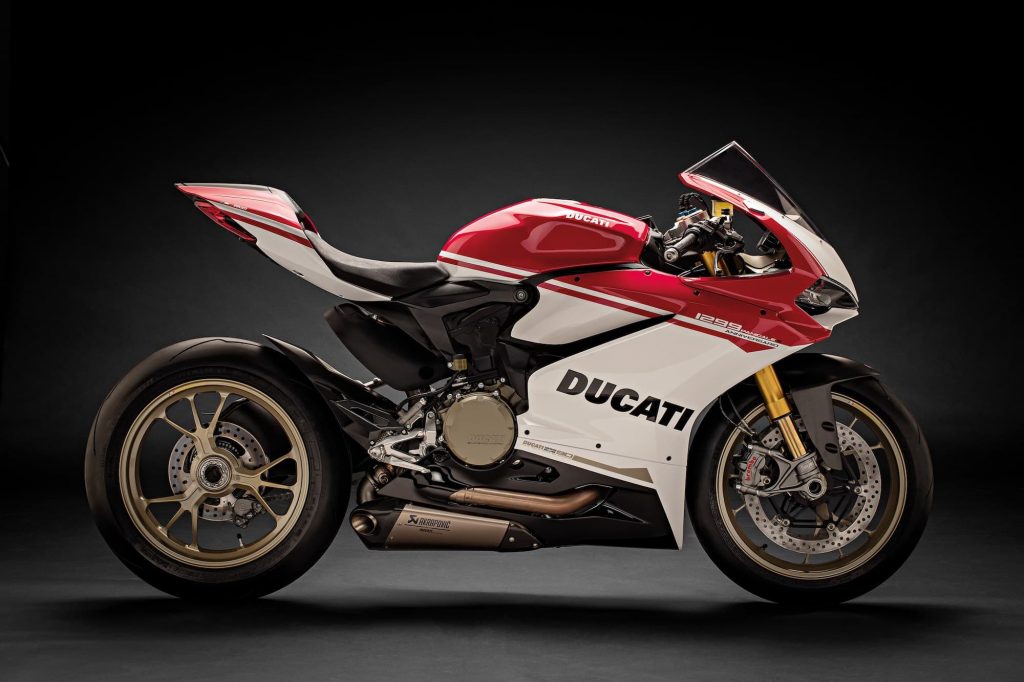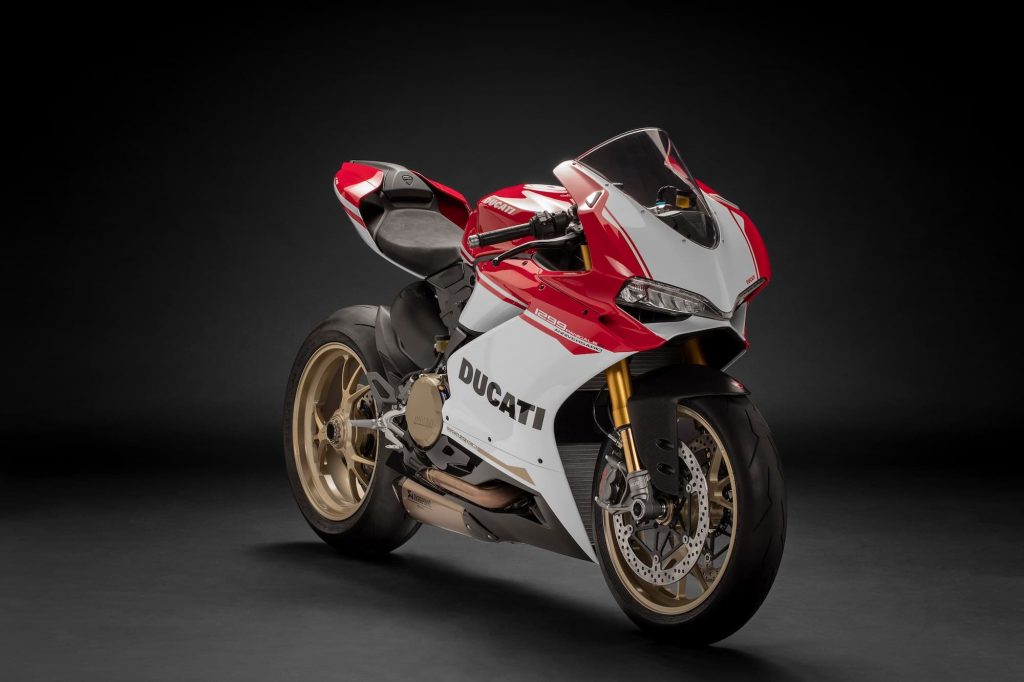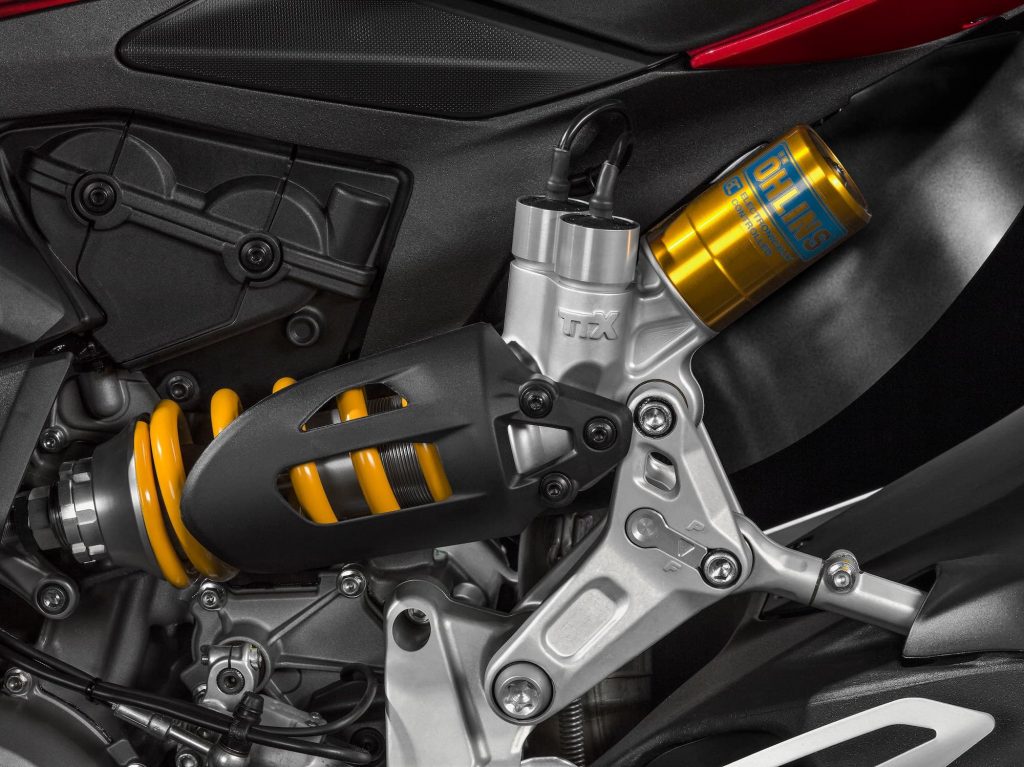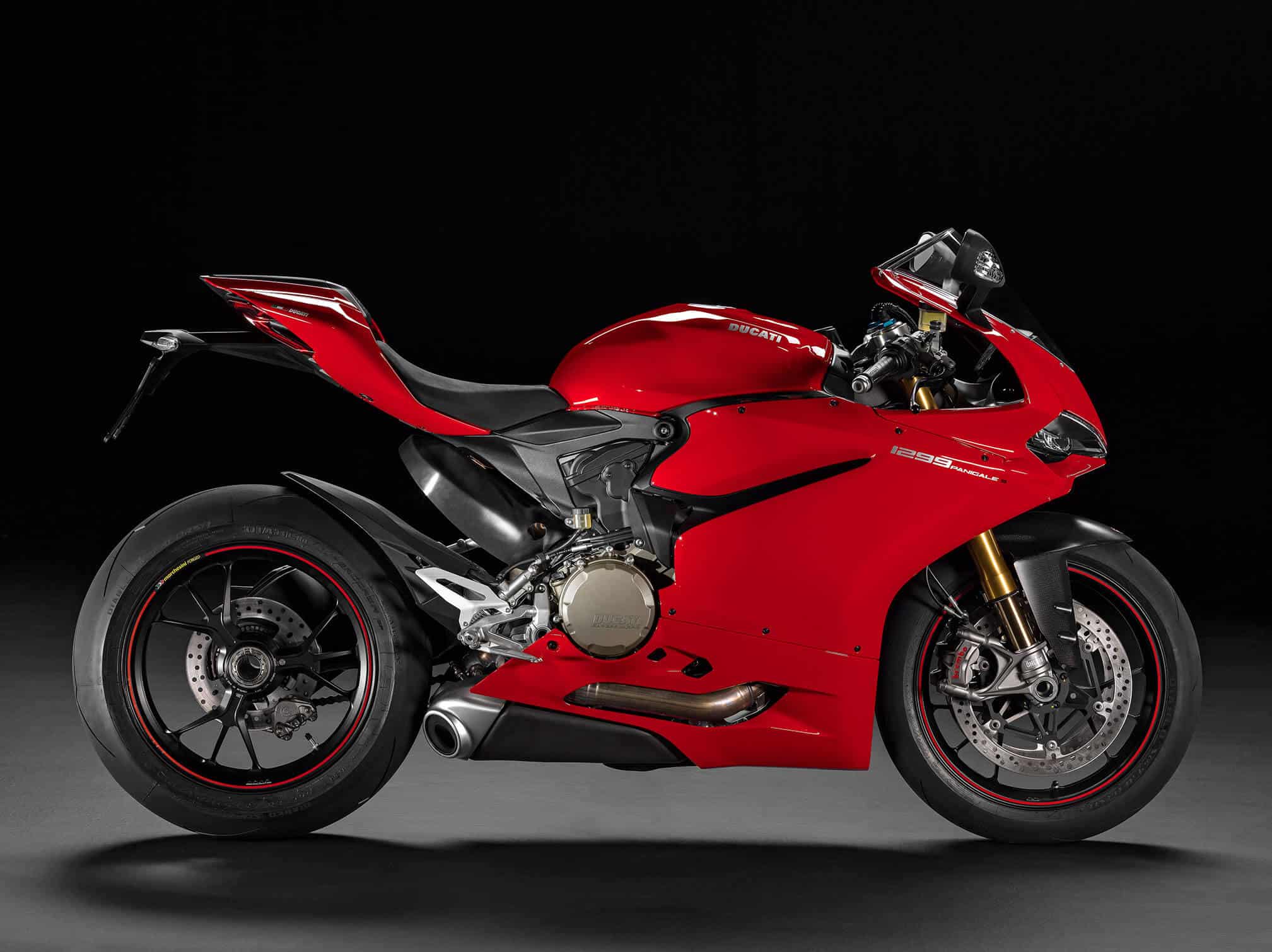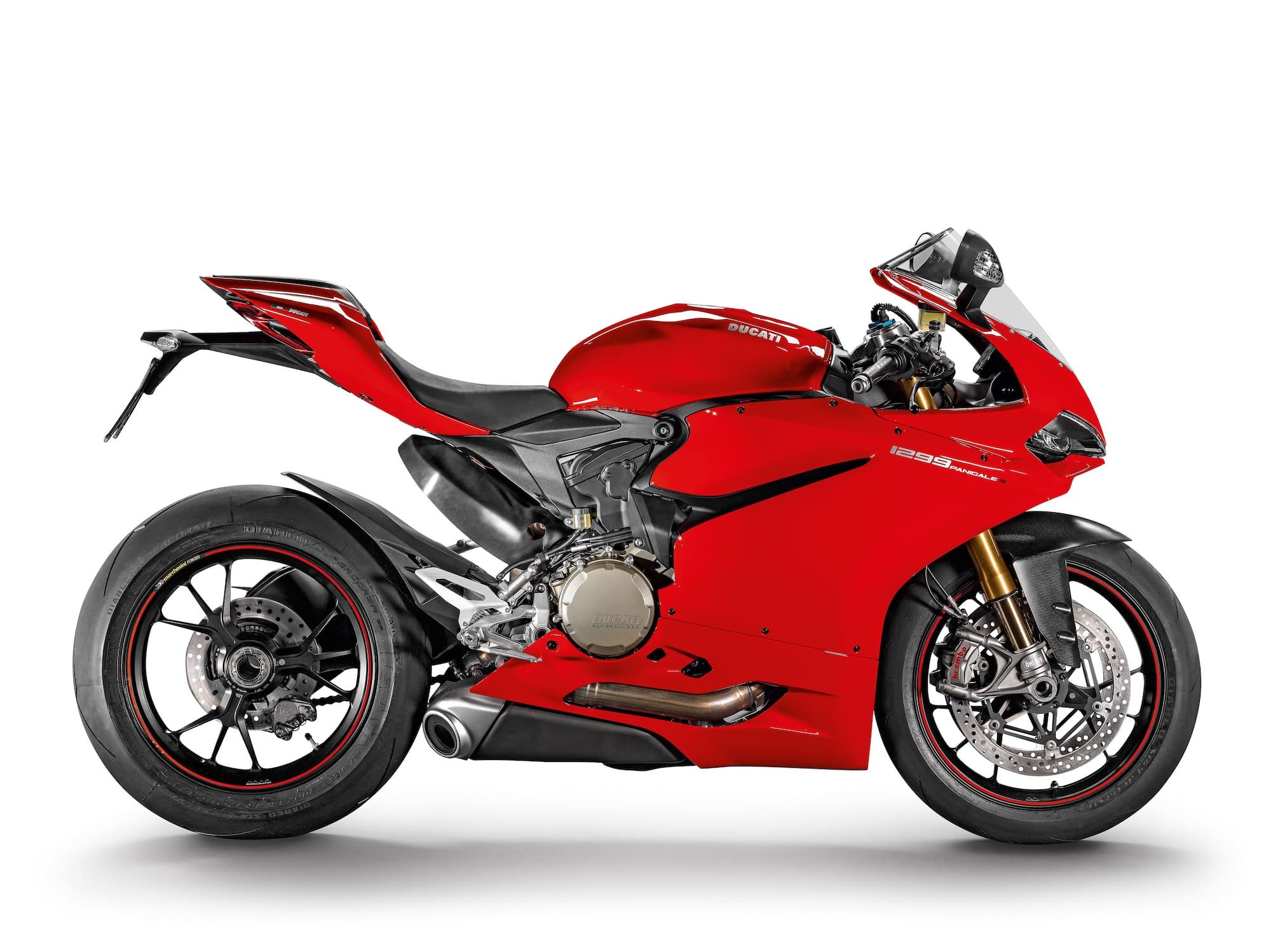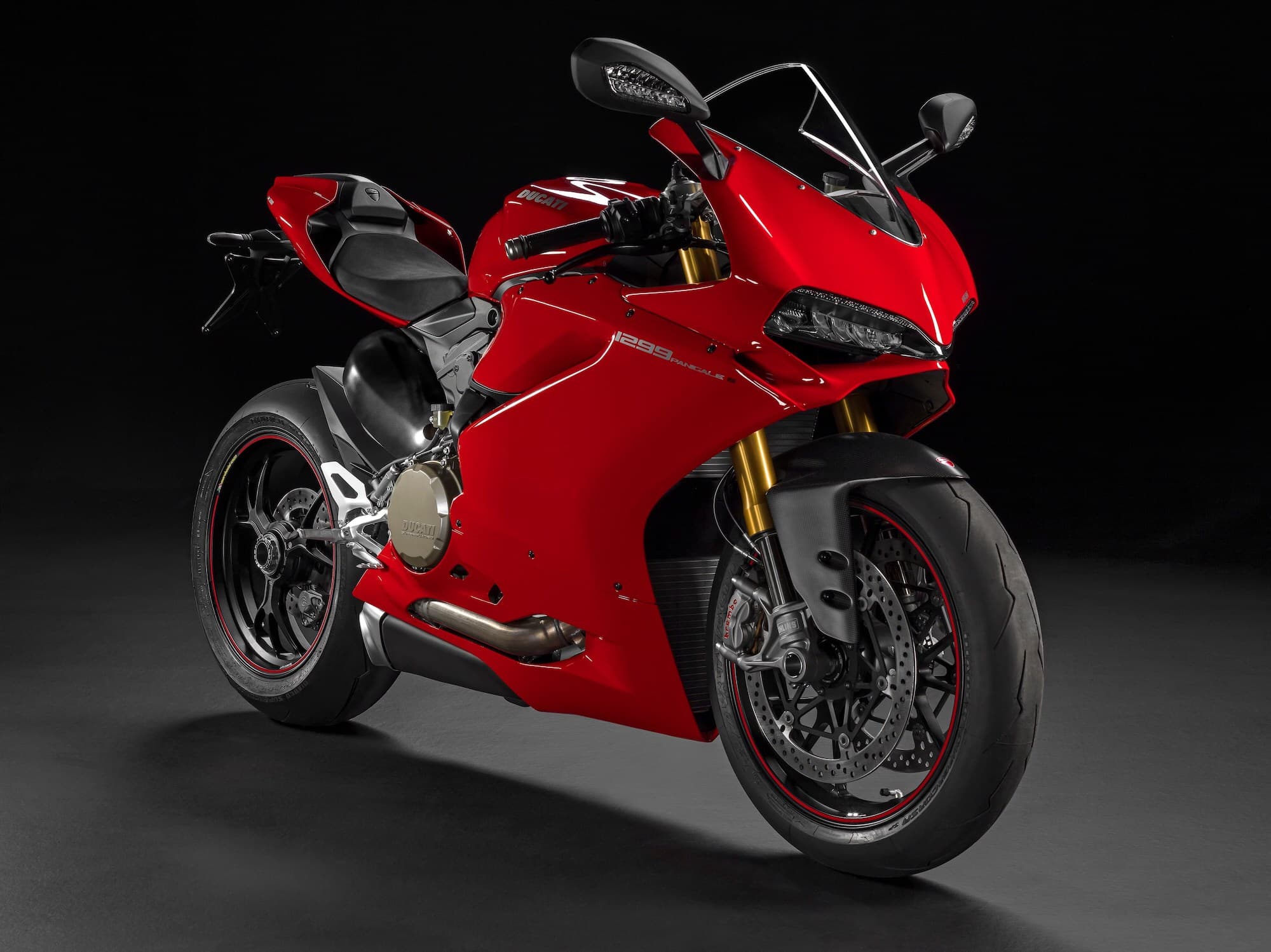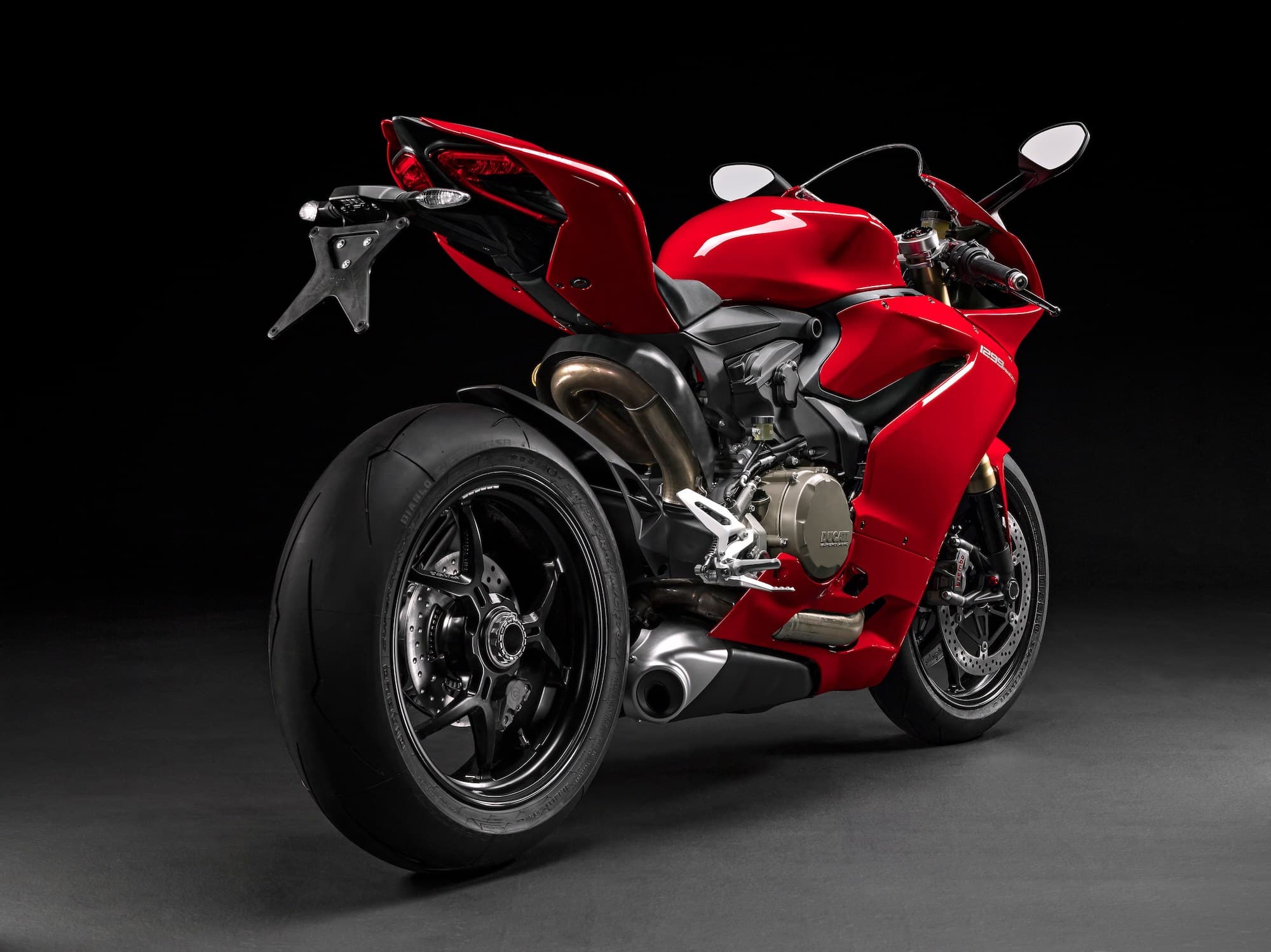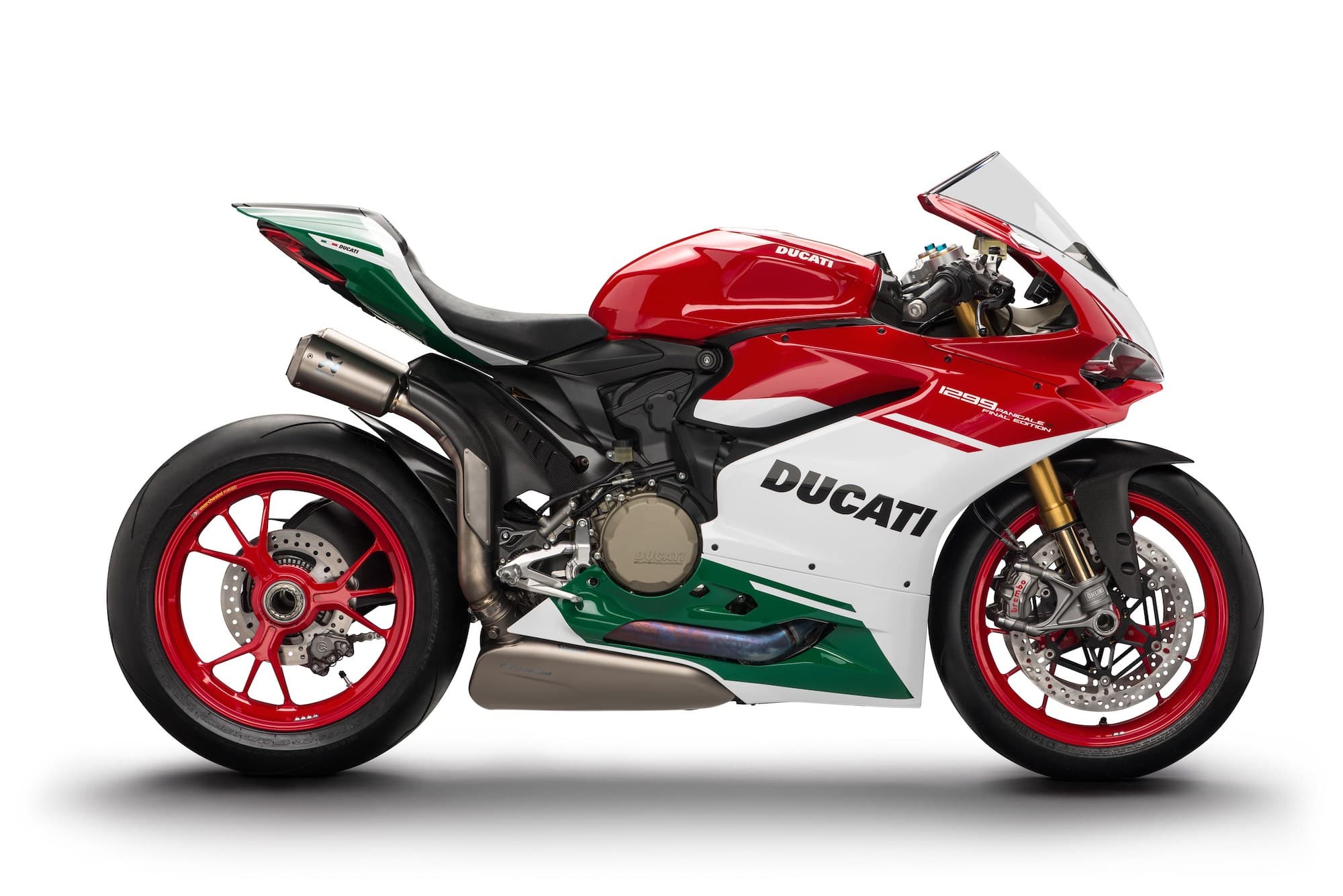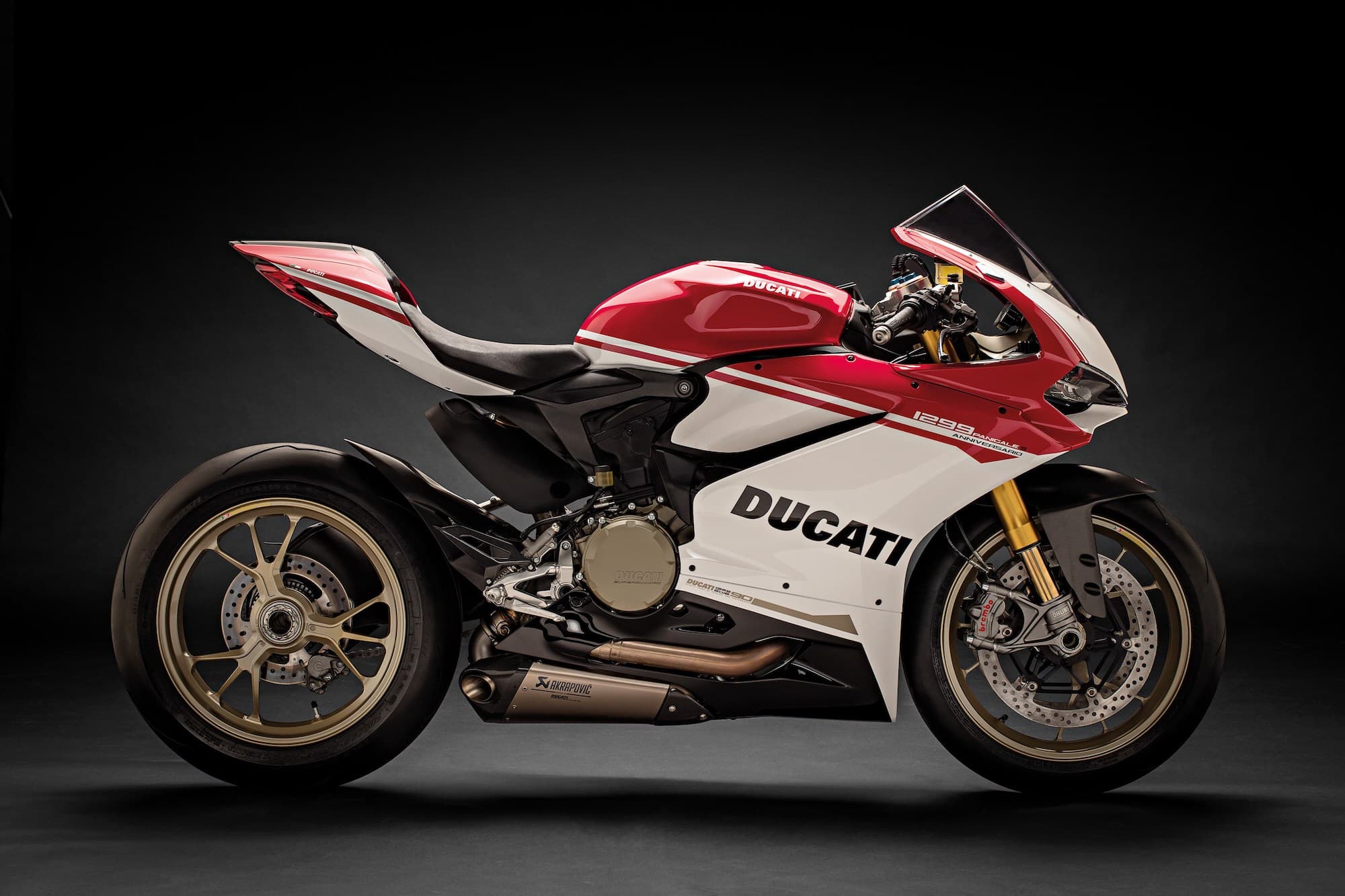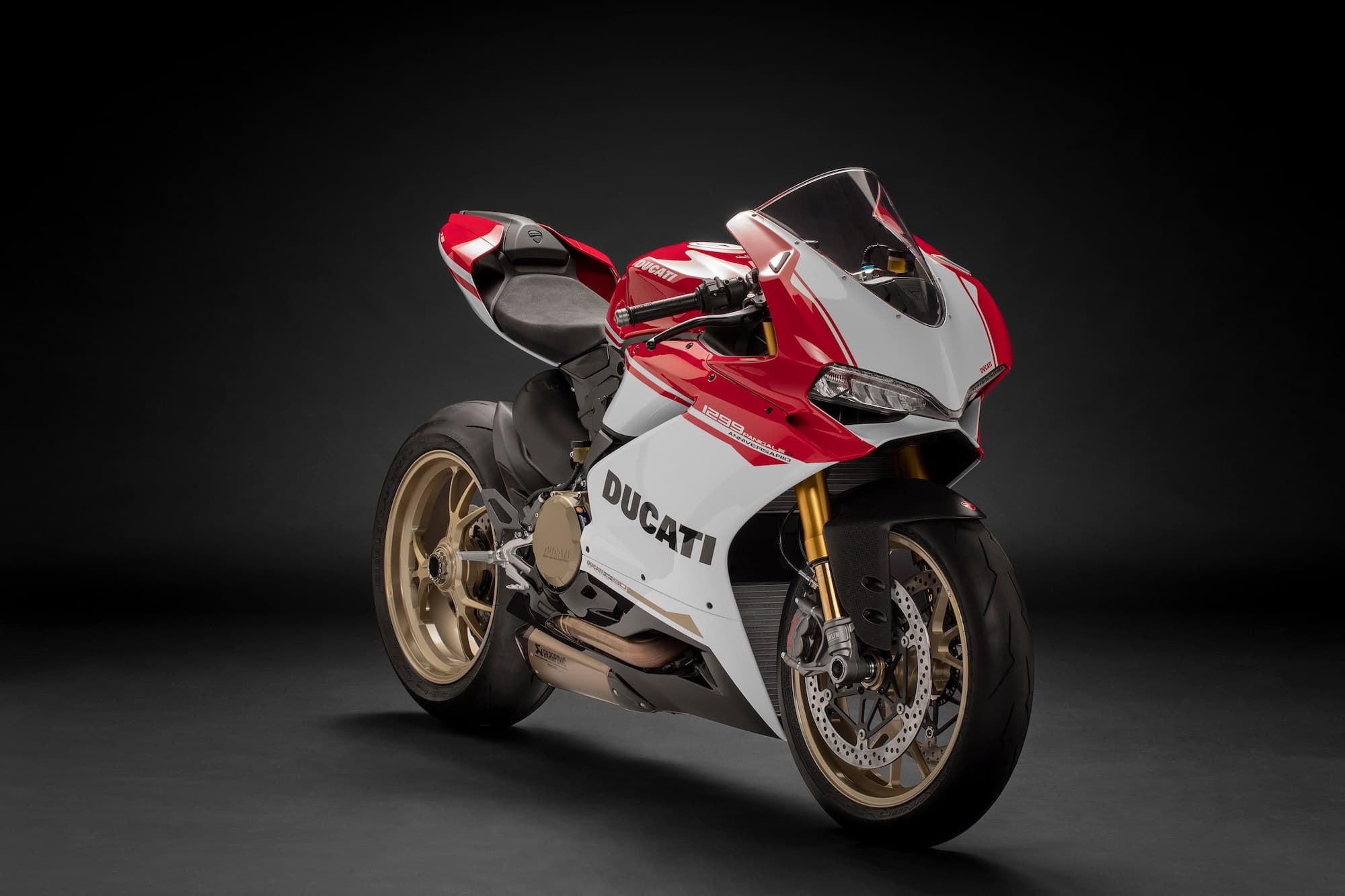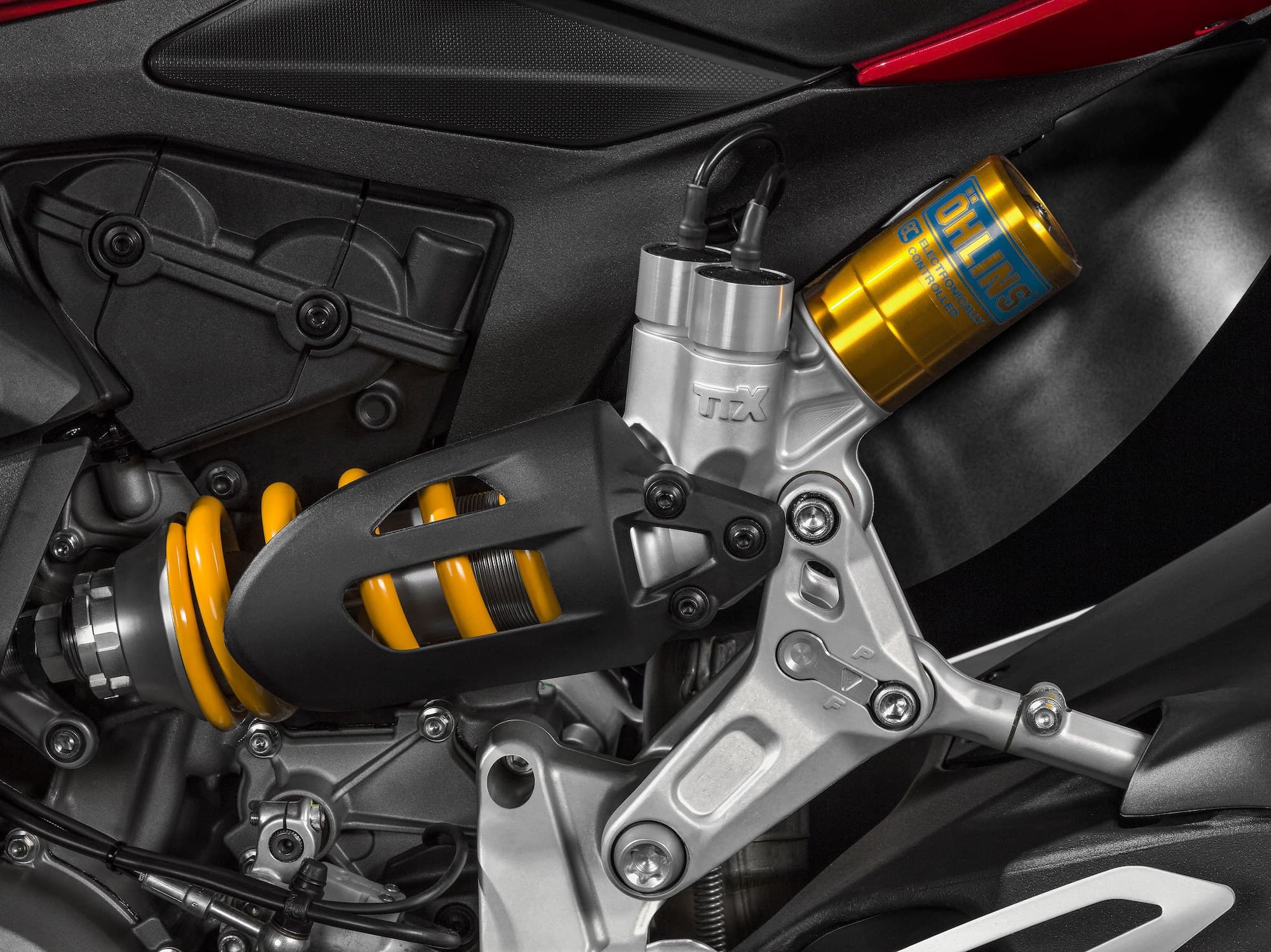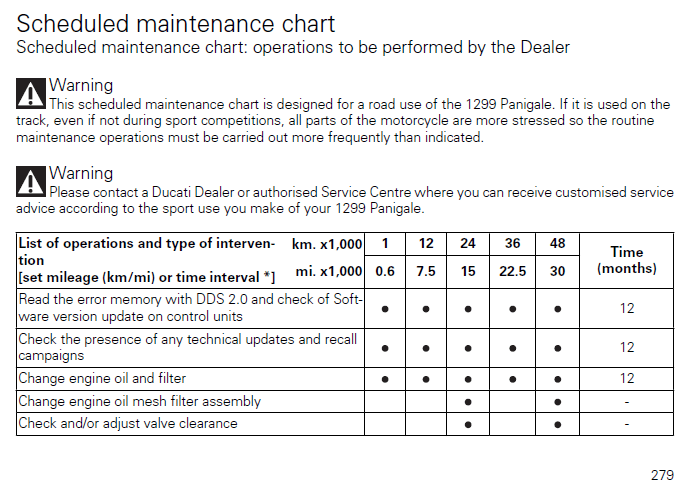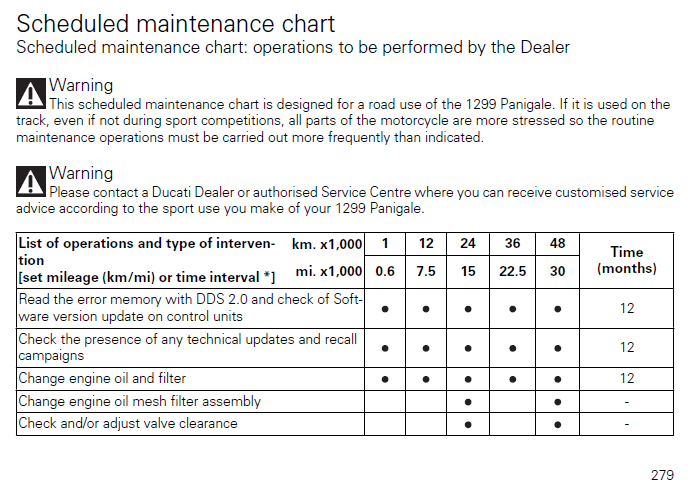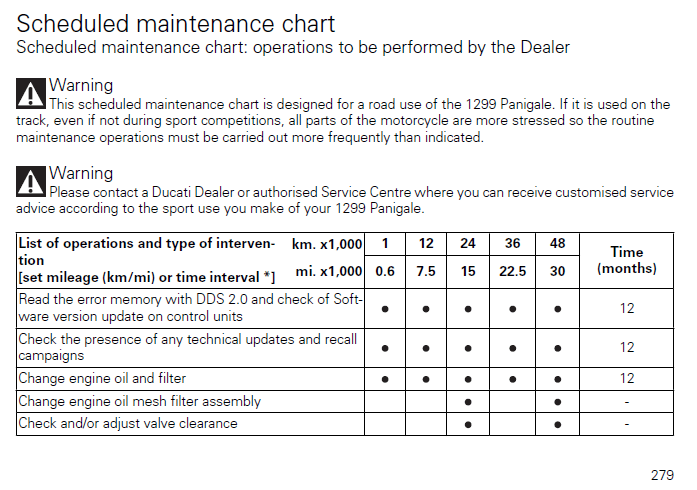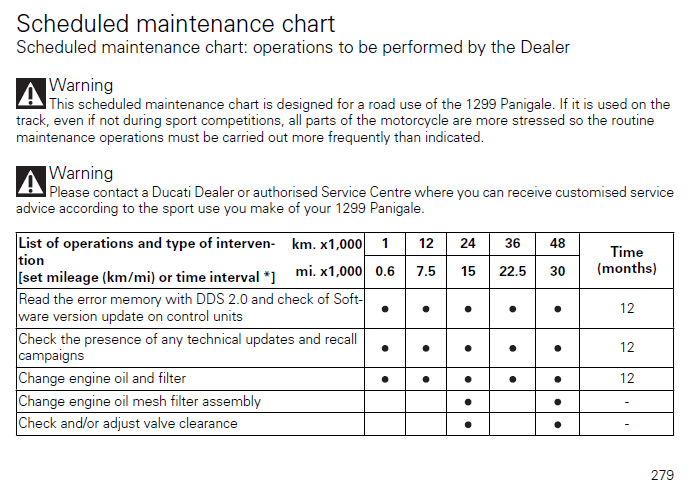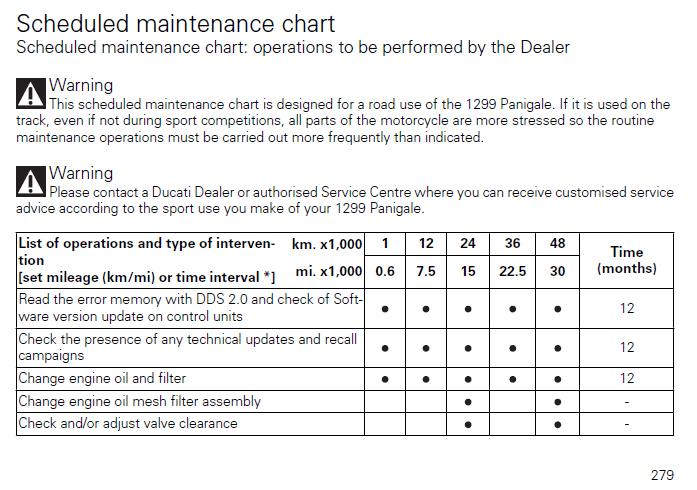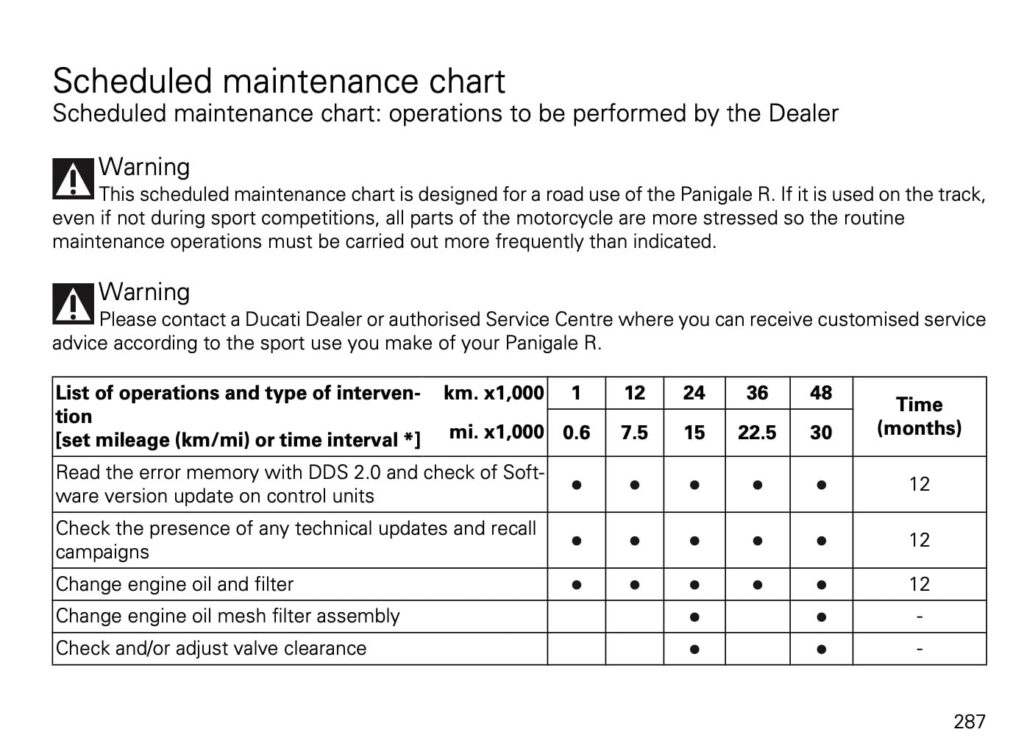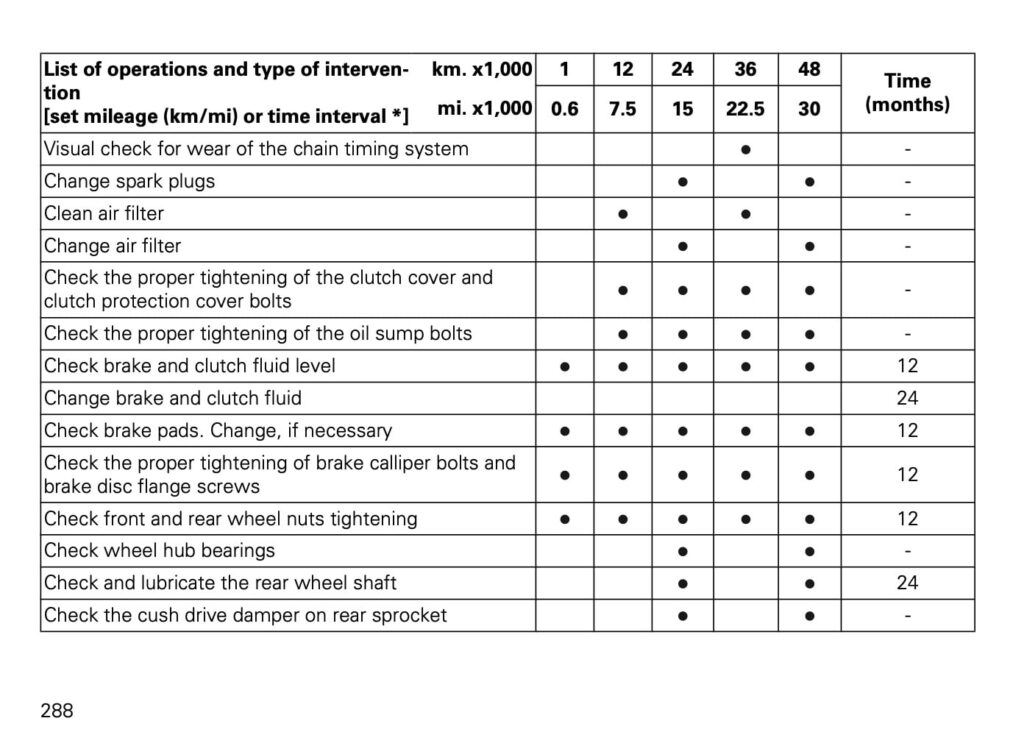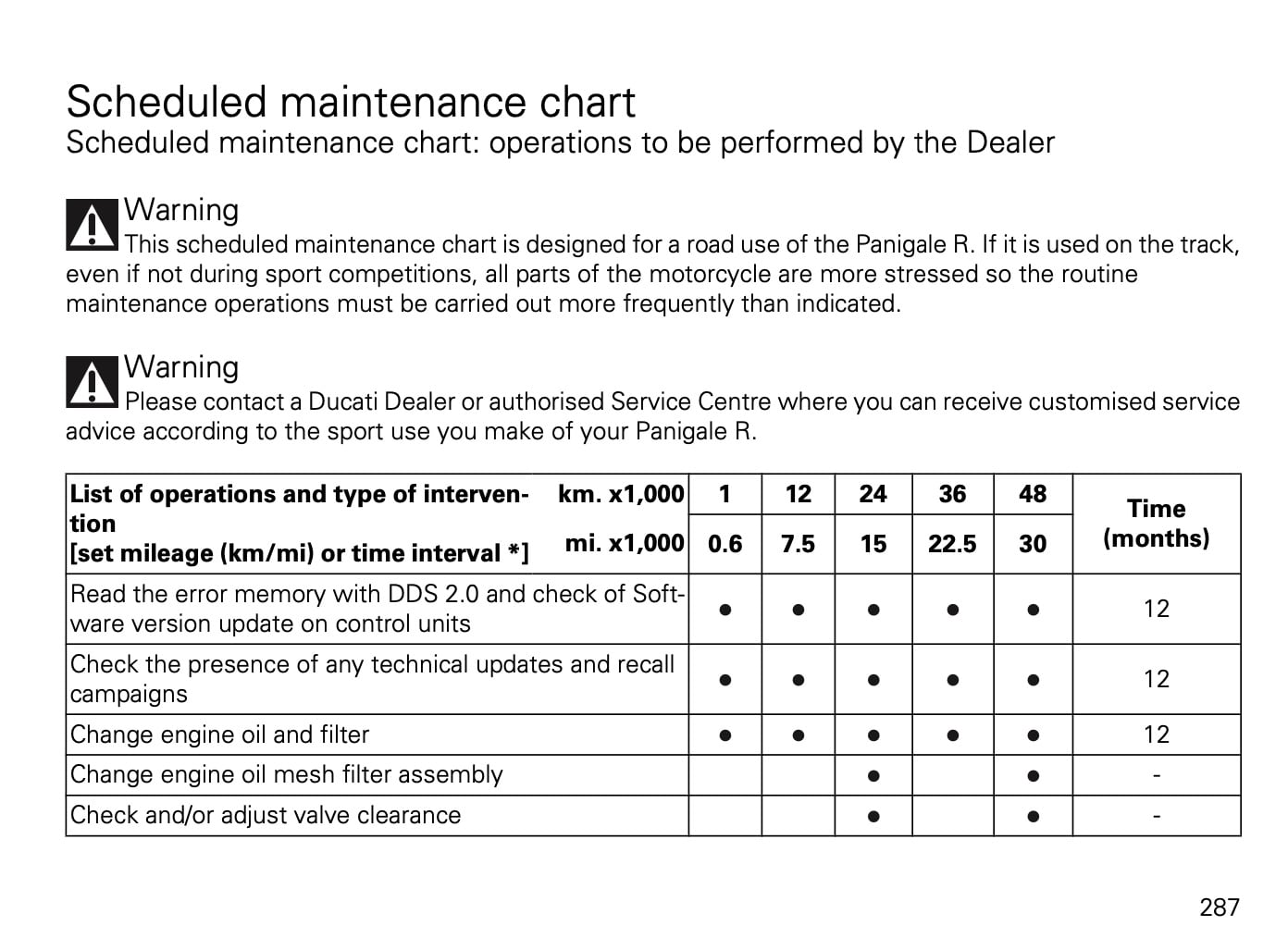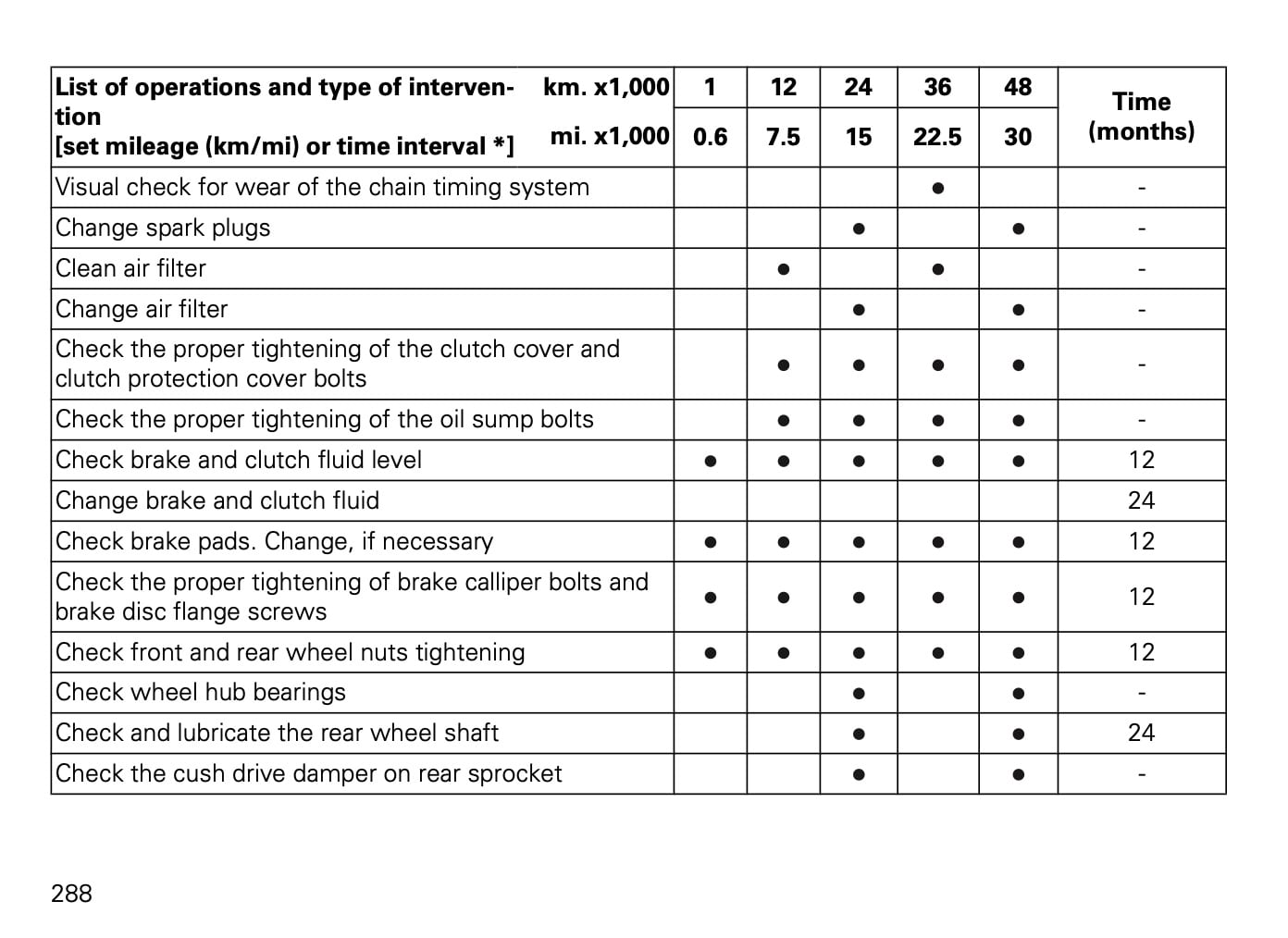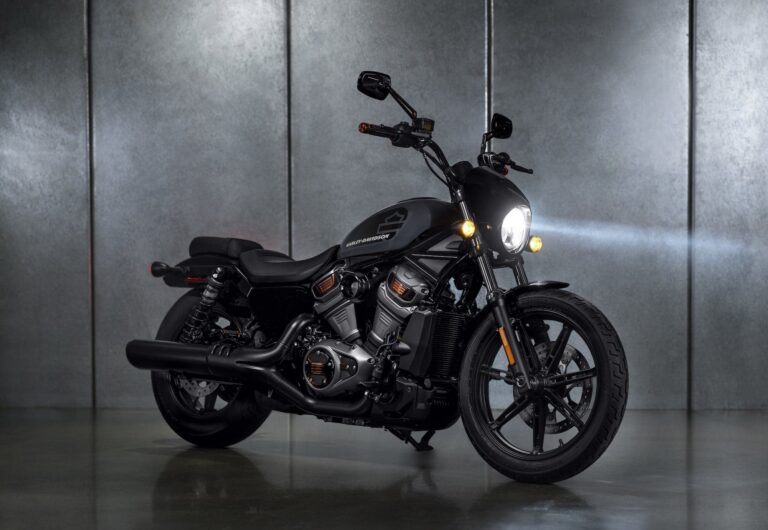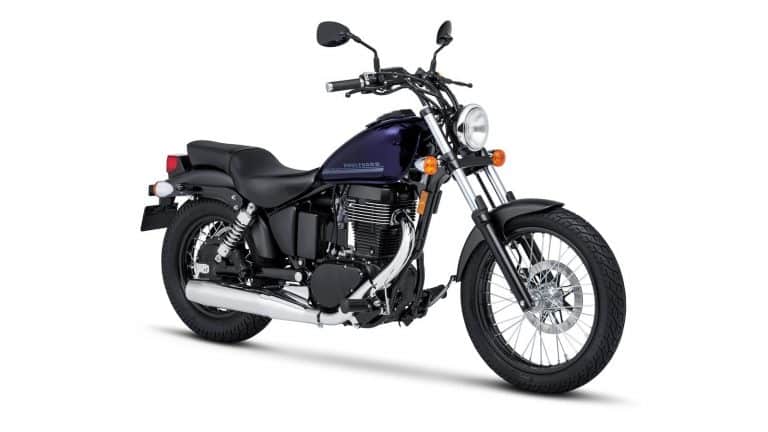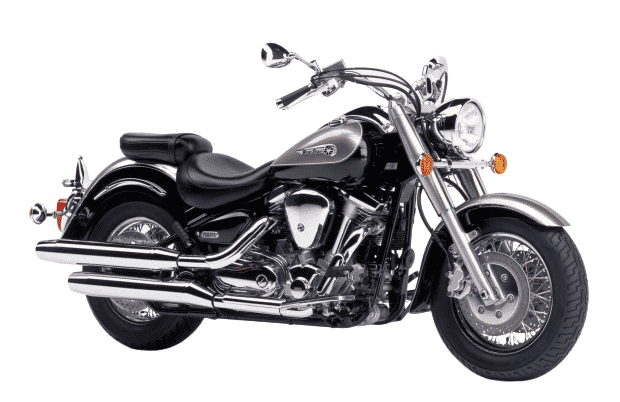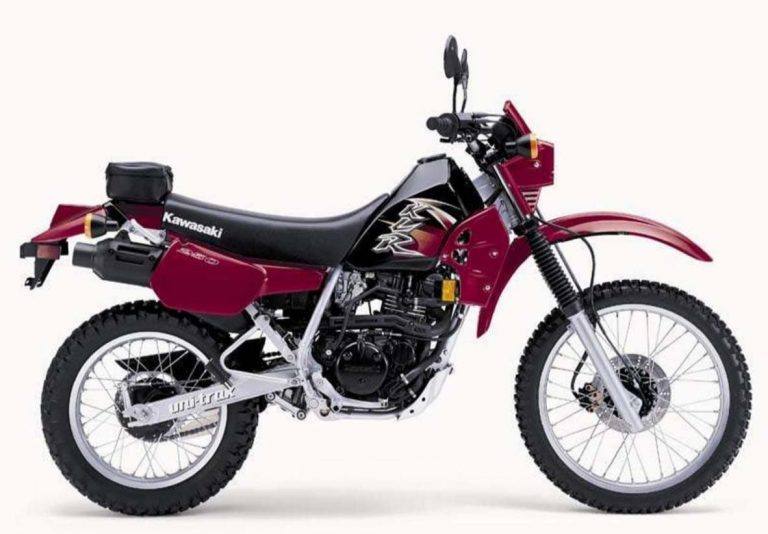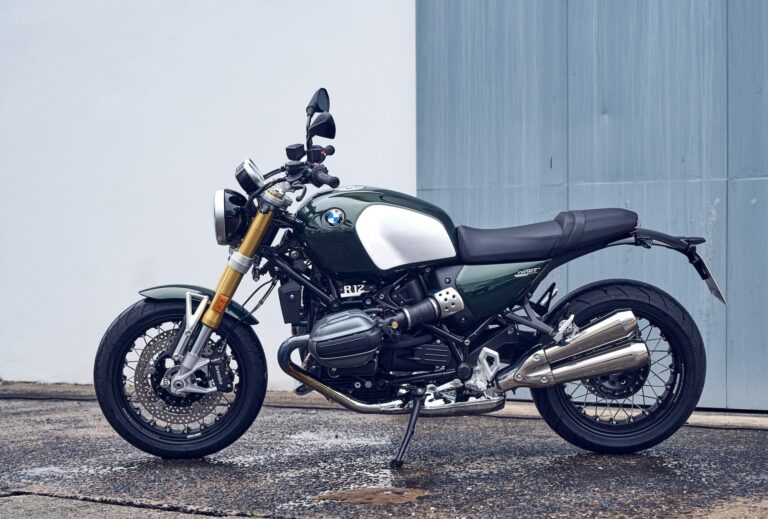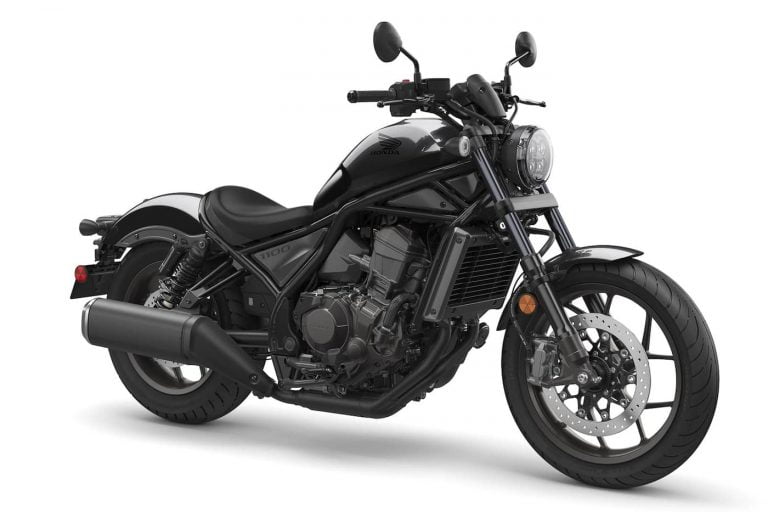Ducati 1299 Panigale (2014-2019, including S and R) Maintenance Schedule
The Ducati 1299 Panigale maintenance schedule and service intervals — sourced from the owner’s manual.
The Ducati 1299 Panigale was an update to the Ducati 1199 Panigale. Like the 1199, the 1299 still has chain driven cams, and a fairly wide service interval between times when you have to check the valves.
The 1299 Panigale has a 1285cc engine that’s tuned for an incredible 153 kW (205 hp). Obviously, you need rider aids to put all that to the ground (well, I do), so the 1299 comes equipped with traction control, cornering ABS, and the new engine brake control (EBC) which optimises vehicle stability under extreme turning conditions.
The 1299 Panigale, released in 2014 and produced through 2018 (after which it was replaced by the Panigale V4), was also released in S and R versions, as well as the stunning 2017 Anniversario, pictured above. There was also a 1299 Panigale Final Edition also up to model year 2018.
This site has links from which we earn a commission (which unfortunately nobody can save, not even us). If you appreciate this research work, then please use those links. Thanks.
Ducati 1299 Panigale Service Intervals
Overall, the Ducati 1299 Panigale (including S and R models) has 7500 mile / 12000 km or annual service intervals. At every service, change the oil and filter, and do a series of checks on the safety, suspension, and drivetrain systems.
The major “Desmo” service for the Ducati 1299 Panigale is every 15000 miles or 24000 km. That’s when you change the plugs and air filter, and check the valve clearances.
Luckily, Ducati moved to a chain timing system for the 1199 Panigale (including the 1299 Panigale, and even its contemporary the 959 Panigale), improving on the belt timing system from earlier pre-Panigale models because the belts don’t wear as much. Ducati mandates a 30000 mile / 48000 km inspection interval for the timing chain.
Beside that, regularly change the coolant, brake fluid, and clutch fluid.
Maintaining the Ducati 1299 Panigale
Firstly, make sure you equip yourself with the right tools.
Whenever maintaining a Ducati with a single-sided swingarm, you need at least
- A motorcycle stand suitable for a single sided swingarm (although I prefer a regular paddock stand with a heavy bar through the middle — it’s more stable)
- A special Ducati eccentric spanner to adjust the chain tension on the “eccentric hub”
Aside from that, you may need general motorcycle maintenance tools, and then the following things to replace.
| Part | Ducati 1299 Panigale Spec |
|---|---|
| Engine oil | Ducati recommends Shell Advance Ultra 15W-50 motorcycle oil for all its motorcycles, or alternatively “motorcycle engine oil having the same degree SAE 15W-50 and meeting the following specifications JASO: MA2 and API: SM”. You need 3.4L for a complete oil change. It’s hard to find and expensive so people suggest Mobil 1 Synthetic 15W-40.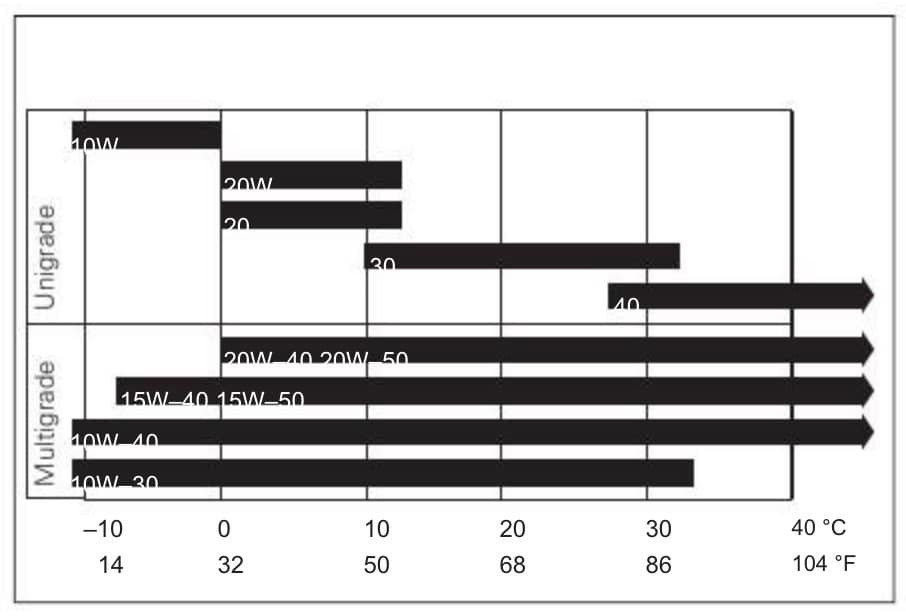 |
| Oil filter | Genuine Ducati part is 44440312B the Ducati Panigale motorcycles. You can also use a HifloFiltro HF159 oil filter. |
| Brake fluid, Clutch fluid | Ducati recommends Shell Advance DOT 4, but that’s quite hard to find, so Castrol DOT 4 Synthetic is a high-quality alternative. |
| Coolant | Ducati recommends Shell Advance Coolant or a 35-40% mix of Glycoshell, a Nitrite, Amine, and Phosphate-free coolant. There are various other coolants that may fit the bill, depending on your application (anything from sitting in a living room, where a permanent antifreeze is best, through to racing every day, where many prefer water + anti-corrosion inhibitors) |
| Timing belt | Congratulations, your Ducati 1299 Panigale has a timing CHAIN! No belt to replace. |
| Front brake pads | OEM part number for the front pads is 61340961A (for one pair). You can also use EBC FA447HH for more bite and less fade as you apply pressure. |
| Rear brake pads | OEM part number for the rear pads is 61340381A. You can also use EBC FA266HH for more bite and less fade as you apply pressure. |
| Air filter | Air filter part number is 42610491A. You can also use K&N part DU-1112. |
| Spark plugs | NGK code MAR9A-J. Note they’re sold individually. |
Regular maintenance for the Ducati 1299 Panigale
This is maintenance that you can do yourself (though the manual says you need a dealer to do it).
Every 1 000 km / 600 miles OR 6 months (whichever comes earlier), perform the following maintenance:
| Regular maintenance for the Ducati 1299 Panigale |
|---|
| Check engine oil level |
| Check brake fluid level |
| Check tyre pressure and wear |
| Check the drive chain tension and lubrication. If necessary, contact your dealer
to adjust components. |
| Check chain and sprocket for wear. If necessary, contact your dealer to replace components. |
| Check brake pads. Replace if necessary. |
Ducati 1299 Panigale Maintenance Schedule Table
This maintenance schedule is in the same format as in the manual, though altered to fit this screen.
This scheduled maintenance chart is designed for road use of the 1299 Panigale. If you use it on the track, even if not racing, then the whole motorcycle is more stressed, and more regular maintenance might be needed.
Notes
- The below maintenance table has distances and times. Conduct the service when you get to the earlier of the two.
- The break-in service is omitted (that time has passed)
- [D]: These items need dealer tools or resources
| Km. x1000 | 12 | 24 | 36 | 48 | Time |
|---|---|---|---|---|---|
| mi. x1,000 | 7.5 | 15 | 22.5 | 30 | (months) |
| [D] Read the error memory with DDS 2.0 and check of Software version update on control units | • | • | • | • | 12 |
| [D] Check the presence of any technical updates and recall campaigns | • | • | • | • | 12 |
| Change engine oil and filter | • | • | • | • | 12 |
| Change engine oil mesh filter assembly | • | • | – | ||
| Check and/or adjust valve clearance | • | • | – | ||
| Visual check for wear of the chain timing system | • | – | |||
| Change spark plugs | • | • | – | ||
| Clean air filter | • | • | – | ||
| Change air filter | • | • | – | ||
| Check the proper tightening of the clutch cover and clutch protection cover bolts | • | • | • | • | – |
| Check the proper tightening of the oil sump bolts | • | • | – | ||
| Check brake and clutch fluid level | • | • | • | • | 12 |
| Change brake and clutch fluid | 24 | ||||
| Check brake pads. Change, if necessary | • | • | • | • | 12 |
| Check the proper tightening of brake calliper bolts and brake disc flange screws | • | • | • | • | 12 |
| Check front and rear wheel nuts tightening | • | • | • | • | 12 |
| Check wheel hub bearings | • | • | – | ||
| Check and lubricate the rear wheel shaft | • | • | – | ||
| Check the cush drive damper on rear sprocket | • | • | – | ||
| Check the proper tightening of final drive front and rear sprocket nuts | • | • | • | • | 12 |
| Check final drive chain sliders for wear | • | • | • | • | 12 |
| Check final drive chain tension and lubrication | • | • | • | • | 12 |
| Check tightening of water-oil heat exchanger retaining screws | • | • | • | • | – |
| Check steering bearings and lubricate, if necessary | • | • | 24 | ||
| Change front fork fluid | 36 | ||||
| Visually check the front fork and rear shock absorber seals | • | • | • | • | 12 |
| Check for proper tightening of the frame-to-engine fasteners and swinging arm | • | • | • | • | – |
| Check the freedom of movement and tightening of the side stand | • | • | • | • | 12 |
| Visually check the fuel lines | • | • | • | • | 12 |
| Check rubbing points, clearance, freedom of movement and positioning of hoses and electric wiring in view | • | • | • | • | 12 |
| Lubricate the levers at the handlebar and pedal controls | • | • | • | • | 12 |
| Change coolant | • | 48 | |||
| Check coolant level | • | • | • | • | 12 |
| Check electric fan operation | • | • | • | • | 12 |
| Check tyre pressure and wear | • | • | • | • | 12 |
| Check the battery charge level | • | • | • | • | 12 |
| Check idling | • | • | • | • | 12 |
| Check secondary air system operation | • | • | – | ||
| Check the operation of all electric safety devices (side stand sensor, front and rear brake switches, engine kill switch, gear/neutral sensor) | • | • | • | • | 12 |
| Check the indicators and lighting | • | • | • | • | 12 |
| Reset the Service indication through the DDS 2.0 | • | • | • | • | – |
| Road test of the motorcycle, testing the safety devices (ex. ABS and DTC) | • | • | • | • | 12 |
| Softly clean the motorcycle | • | • | • | • | 12 |
| [D] Fill out that the service was performed in on-board documentation (in Service Booklet) | • | • | • | • | 12 |
About the Ducati 1299 Panigale
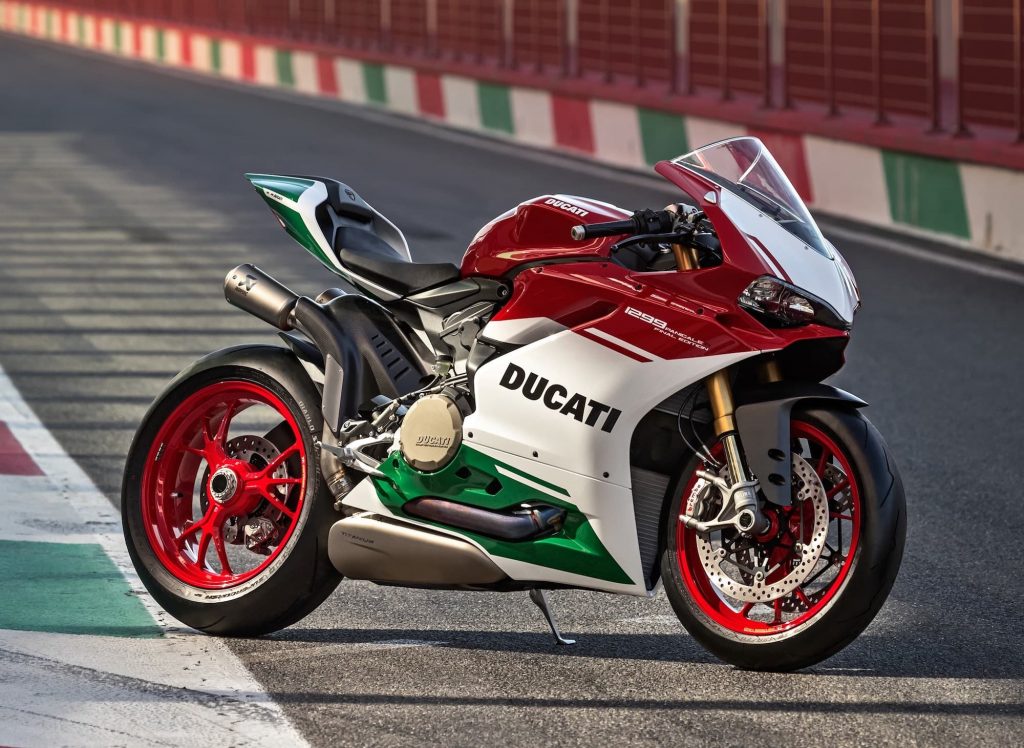
The Ducati 1299 Panigale is/was the last of the big V-twins before the Ducati Panigale V4 stole the limelight.
Ducati still makes twins of course, and that’s unlikely to change before they all die off in favour of electric motorcycles. Ducati’s current V-twin superbike is the Ducati Panigale V2, but that’s quite a different motorcycle.
The 1299 Panigale is, for those not familiar with the line, a Ducati superbike. It’s built for racing, but comes in various spec levels, depending on your actual appetite for the track (it’s ok to just have one to ride around your local mountains… or even to keep parked in your garage or living room!)
But the 1299 Panigale is unmistakably a race bike. It has a fairing, a stomping engine, and high footpegs and low clip-ons. It’s intended for going fast and leaning over hard.
The Ducati 1299 Panigale is based on a “Superquadro” 1285cc V-twin engine, the most powerful V-twin produced to that date by Ducati. The engine made a claimed 151 kW (202 bhp / 205 PS) at 10500 rpm, and an equally giant 145 Nm (107 ft-lb) of torque at 8750 rpm.
The 1299 Panigale continued the trend of adding technology to keep the power under check. It came equipped with an IMU that helped modulate power and braking depending on various factors, including lean angle, pitch, acceleration, and so on.
The Ducati 1299 Panigale also came with Ducati’s “engine brake control” (EBC)
The 1299 Panigale came in a number of different flavours, depending on your intended use, budget, and appetite for paying for a collector’s item.
The summary of the core differences between the Ducati 1299 Panigale, Panigale S, Panigale R, and Panigale R Final Edition are below.
| Part | 1299 Panigale | 1299 Panigale S | 1299 Panigale R | 1299 Panigale R FE |
|---|---|---|---|---|
| Engine | 1285 cc | 1285 cc | 1198 cc (World SBK regs) | 1285 cc (Superleggera internals) |
| Peak power (claimed) | 150.8 kW (205 PS) @ 10500 rpm | 150.8 kW (205 PS) @ 10500 rpm | 150.8 kW (205 PS) @ 11500 rpm (higher) | 154 kW (209 PS) @ 11000 rpm |
| Front forks | Marocchi 50mm | Öhlins NIX30 (semi-active) | Öhlins NIX30 (mechanical) | Öhlins NIX30 (mechanical) |
| Rear shock | Sachs | Öhlins NIX30 (semi-active) | Öhlins TTX36 (mechanical) | Öhlins TTX36 (mechanical) |
| Wheels | Tri-Y cast alloy | Marchesini Tri-W forged alloy | Marchesini Tri-W forged alloy | Marchesini Tri-W forged alloy |
| Exhaust | Standard 2-1-2 system | Akrapovič titanium | Akrapovič titanium | Akrapovič titanium |
| Kerb weight | 190.5 kg (420 lb) | 190.5 kg (420 lb) | 184 kg (406 lb) | 190 kg (419 lb) |
The above was sourced from Ducati’s website and press materials.
Ducati 1299 Panigale Owner’s Manual
The above info was sourced from the owner’s manual for the Ducati Panigale base model, S, and R for all model years, comparing them to observe any changes.
You can download the manuals for these Ducatis from the Ducati website here.
